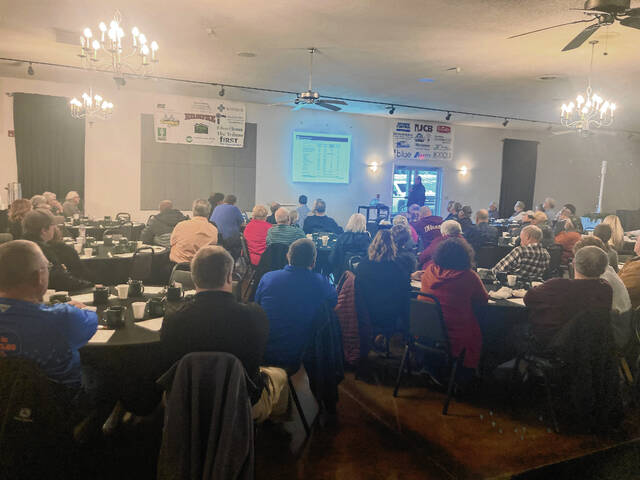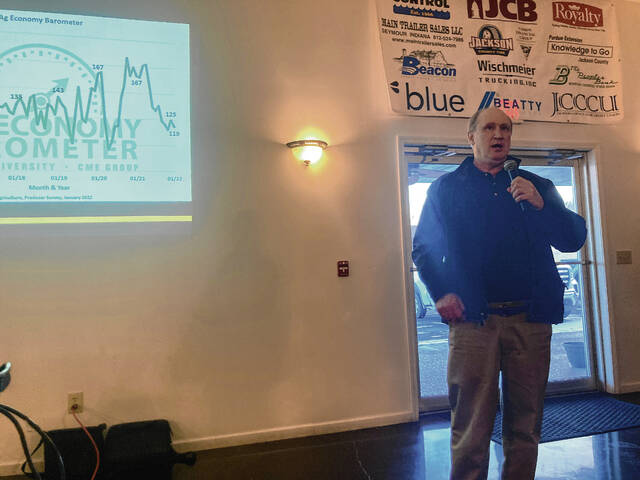BROWNSTOWN — Some members of Jackson County’s agricultural community recently were treated to a free breakfast and the opportunity to learn more about the economic outlook for farming this year.
The event was the 19th annual Farmers Breakfast, sponsored by the Community Foundation of Jackson County in partnership with Purdue University Cooperative Extension Service and Premier Companies. It was held Wednesday morning at Pewter Hall.
Michael Langemeier, a professor with the Purdue University Department of Agricultural Economics, gave the keynote address and focused on what the economics of farming might look like in 2022 compared to 2021.
Langemeier said he is “really optimistic” about farming production this year, despite higher input costs for fuel and fertilizer.
He said he believes 2021 was a really good year for farmers and expects 2022 to be better than 2020 but not as great as this past year.
According to data collected by Purdue’s Center for Commercial Agriculture, some of the most commonly used words on open-worded questions from surveys that were completed by farmers were “politics,” “inputs,” “environment,” “stability,” “regulation” and “inflation.”
This signaled to Langemeier that there is a lot of uncertainty among the farming community, he said.
One survey asked farmers, “What is your biggest concern for your farming operation?”
The top response was higher input costs. Other choices included government policy and COVID-19.
Thinking about inflation, Langemeier said it scares farmers after the United States experienced high inflation in the early 1980s. The way to bring inflation down, he said, is to have high interest rates.
Corn farmers should be happy, he said. Langemeier said the crop is very competitive and China is importing a lot of corn, which is unusual.
In early September 2021, the price for corn was around $5 for a bushel. The price now sits at around $6.26.
Langemeier said while he doesn’t see a sign for a crash in corn prices, farmers should be careful about how long they hold onto their crop. He recommended not selling past May because after that point, there’s a chance for prices to increase, but equally, they could plummet.
Soybeans are in a similarly good position, he said. In the past two weeks, soybean prices have increased, and Langemeier said he believes this is because Brazil is currently having production issues.
Brazil and the United States are the world’s largest producers of soybeans with the former producing 40% of the world’s soybeans and the latter producing 33%.
While Langemeier is optimistic for soybean farmers, he warned Brazil’s issues might not persist.
Seymour attorney Denise Connell with Lorenzo, Bevers, Braman and Connell spoke before Langemeier about how the community’s farmers can give even more back to the community through the Community Foundation.
She said the COVID-19 pandemic helped people realize how farmers are genuinely essential workers.
“As an essential business, I think none of you farmers took a day off during this whole COVID epidemic,” she said. “You went to work every day because you had to. The fact that you were essential was probably one of the first times that people actually realized what that word meant because it was important that you guys were in the field doing what you’re doing, putting food on the table and keeping this country running.”
Dan Davis, president and chief executive officer of the Community Foundation, said more than $10,000 has been sold in grain through the Gift of Grain program.
Gift of Grain is a program offered by the Community Foundation that allows farmers to donate some of their grain. That grain is then sold by a grain elevator for the foundation to go toward any projects, funds, scholarships or endowments that a farmer chooses.
Through this process, farmers don’t have to declare that grain sale as income.
The foundation holds a Head to Head Green vs. Red contest each year where tractor enthusiasts can donate to the organization in exchange for votes toward their favorite equipment line.
Davis revealed that green won this year with 63% of the vote, and it was a tighter competition than previous years.
Connell said the foundation is holding around $17 million in assets and has gifted out approximately $10 million in grants and scholarships since it was established in 1992.
While she served on the Boys and Girls Club of Seymour board of directors, Connell said one of the highlights was the club receiving a check from the Community Foundation. She said the club didn’t have to do any work to receive the funds, which were vital for the organization’s operations.




